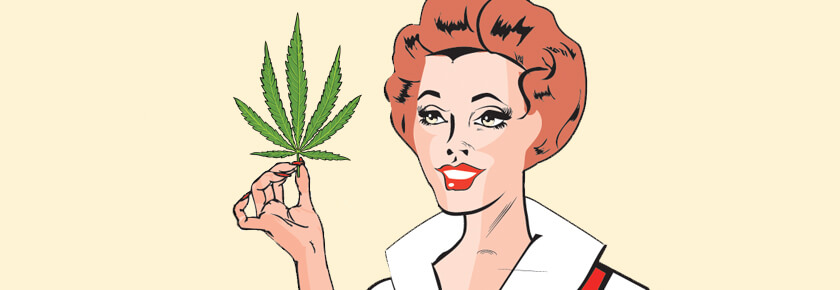Newborn drug tests, surprise home visits, forced adoptions—how the quiet war against mothers who smoke has rallied pro-women, pro-weed groups.
This article was made possible because of the generous support of DAME members. We urgently need your help to keep publishing. Will you contribute just $5 a month to support our journalism?
On a hazy day in May 2012, Diane Fornbacher got an unsettling visit. She was about to leave for her father’s funeral, when two agents from the Department of Youth and Family Services—New Jersey’s version of child-protection services—knocked on her door. The agents, tipped off by her son’s principal, were there to investigate her competency as a mother. Her crime: discussing hemp as a renewable product with her nine-year-old son, for Earth Day.
What the agents didn’t realize was that Fornbacher, 36, wasn’t just some suburban soccer mom. A Women’s Alliance board member at the National Organization for the Reform of Marijuana Laws (a lawyered-up nonprofit that sometimes teams with the ACLU), she refused to let them into her home without a warrant. “In my 20 years as an activist, I haven’t seen a lot of male activists with kids approached like this,” says Fornbacher. “But I have seen a lot of women.”
According to a recent Pew poll, more than half of Americans support marijuana legalization. Despite this momentum, there’s still a stigma looming over moms who smoke weed. If middle-aged-manchild movies have taught us anything, it’s that fathers are expected to blow off steam with their bong buddies, while straight-laced moms are left at home to hold down the fort. That latter image is at odds with the stereotype of women weed smokers as good-time girls. While bikini-clad ladies continue to pervade cannabis-culture events and advertisements, other unflattering, resonant stereotypes in pop culture abound—from Mary Louise Parker’s sexually liberated dealer-mom in Weeds to The Real Housewives of Orange County’s cuckoo stoner nana, who both grapple to reconcile marijuana with family life.
This cultural bias has inspired a number of very vocal pro-cannabis groups—such as NORML’s Women’s Alliance, Marijuana Moms of Beverly Hills, and Moms for Marijuana International—to speak out for their right to toke. And the reality is that every-day moms advocating cannabis through fundraisers, candidate endorsements, and education outreach programs could be secret weapons in mainstreaming marijuana.
Historically, women have taken a more conservative stance toward cannabis than men. In 2010, Mothers Against Drunk Driving lead a powerful campaign against California’s Proposition 19, which would’ve legalized the recreational use of marijuana. Since then, this mom group has remained quiet, if skeptical. “It just makes sense that if marijuana is legalized in a state, there will be more impaired driving. Colorado has seen a rise in that already,” explains Jan Withers, MADD’s national president. (She has a point, though some disagree.) As for moms who smoke? “We purposefully haven’t gone there simply because we are laser-beam focused on drunk driving,” she says. “But we do say that our children are watching us all the time, and we’re modeling behavior.”
Because mothers bear children, they’re often subject to more scrutiny than fathers. Activist moms have been voicing their outrage against cases like Fornbacher’s (whose investigation was eventually dropped), where any inkling of a mother’s weed use can legally warrant state intervention. This can lead to court-mandated substance-abuse classes, random drug-testing, arrest, custody issues, and in extreme cases, child welfare taking away a mother’s kids.
“There is no scientific basis that a parent’s use of marijuana [leads to] neglect,” points out Sara Arnold, a mother of two who’s a board member at the Students for Sensible Drug Policy Outreach, Recruitment & Diversity Committee. “They shouldn’t be going after any cannabis-using mom just as they would not go after a mom solely for the reason that she has a glass of wine at the end of her day. And it is particularly horrific for the state to persecute a medical user [with a card].”
Arnold also expresses concern over the random (and perfectly legal) testing of infants for THC—reminiscent of the crack-baby hysteria of the Reagan era, when mothers of newborns who tested positive for crack were prosecuted. (Though we’ve since learned that crack didn’t actually harm babies, marijuana’s effect on newborns remains a big question mark.) “The testing [can] start prenatally,” says Arnold. “Most women don’t know this, but the paperwork they sign at their first appointment allows for random or specific drug testing, and they can say ‘no.’”
Testing has proven controversial because it can elicit false positives and underscores a culture of profiling. “Typically these women are lower income, not very educated,” says Fornbacher. “They fight as long as they can, financially. Child Protective Services is looking for mistakes—which every parent makes.”
As moms rally to decriminalize marijuana, anti-substance stalwarts such as The Partnership at DrugFree.org—behind the “This is your brain on drugs” commercials in the ’80s—have been taking cue and shifting to more neutral ground. Denise Young Farrell, Vice President and Director of Public Affairs, points to a Partnership poll that reached out to pro-cannabis parents. “It was abundantly clear from the research that [these] parents want to see it regulated. They’re most concerned with the developmental consequences of teen use,” she says, comparing weed regulations to the legal-age limits on cigarettes or alcohol.
Fornbacher agrees—that’s part of NORML’s common-sense gospel. “I don’t want my kids to use cannabis until they’re of age, unless a physician prescribes it to them,” she says. “And people have to educate their children about it.”
After the authorities visited Fornbacher’s house, she noticed that neighborhood moms quietly came out of the woodwork to support her. “A lot of them said, ‘I never told you this, because I didn’t want to out myself—but I consume cannabis, too,” she says. “They were afraid. And that meant a lot to me, because I felt so alone.” She isn’t anymore.
